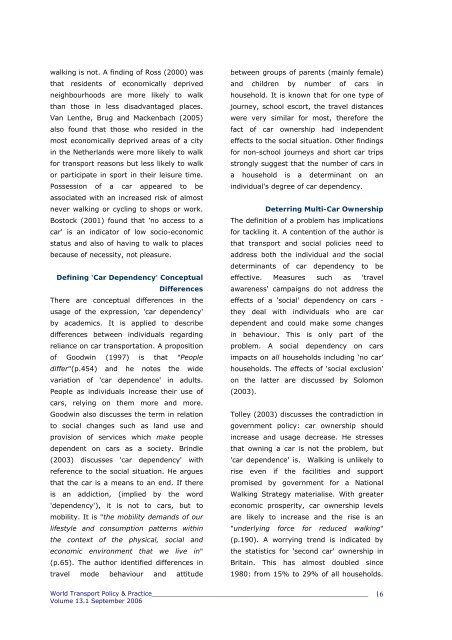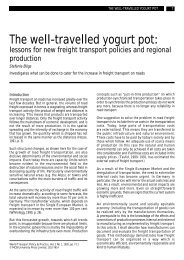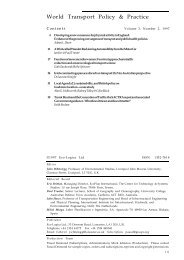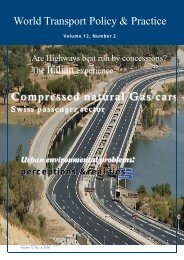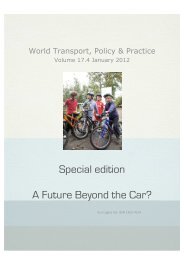Effects of pedestrianisation on the commercial and ... - Eco-Logica
Effects of pedestrianisation on the commercial and ... - Eco-Logica
Effects of pedestrianisation on the commercial and ... - Eco-Logica
You also want an ePaper? Increase the reach of your titles
YUMPU automatically turns print PDFs into web optimized ePapers that Google loves.
walking is not. A finding <str<strong>on</strong>g>of</str<strong>on</strong>g> Ross (2000) was<br />
that residents <str<strong>on</strong>g>of</str<strong>on</strong>g> ec<strong>on</strong>omically deprived<br />
neighbourhoods are more likely to walk<br />
than those in less disadvantaged places.<br />
Van Len<strong>the</strong>, Brug <strong>and</strong> Mackenbach (2005)<br />
also found that those who resided in <strong>the</strong><br />
most ec<strong>on</strong>omically deprived areas <str<strong>on</strong>g>of</str<strong>on</strong>g> a city<br />
in <strong>the</strong> Ne<strong>the</strong>rl<strong>and</strong>s were more likely to walk<br />
for transport reas<strong>on</strong>s but less likely to walk<br />
or participate in sport in <strong>the</strong>ir leisure time.<br />
Possessi<strong>on</strong> <str<strong>on</strong>g>of</str<strong>on</strong>g> a car appeared to be<br />
associated with an increased risk <str<strong>on</strong>g>of</str<strong>on</strong>g> almost<br />
never walking or cycling to shops or work.<br />
Bostock (2001) found that 'no access to a<br />
car' is an indicator <str<strong>on</strong>g>of</str<strong>on</strong>g> low socio-ec<strong>on</strong>omic<br />
status <strong>and</strong> also <str<strong>on</strong>g>of</str<strong>on</strong>g> having to walk to places<br />
because <str<strong>on</strong>g>of</str<strong>on</strong>g> necessity, not pleasure.<br />
Defining 'Car Dependency' C<strong>on</strong>ceptual<br />
Differences<br />
There are c<strong>on</strong>ceptual differences in <strong>the</strong><br />
usage <str<strong>on</strong>g>of</str<strong>on</strong>g> <strong>the</strong> expressi<strong>on</strong>, 'car dependency'<br />
by academics. It is applied to describe<br />
differences between individuals regarding<br />
reliance <strong>on</strong> car transportati<strong>on</strong>. A propositi<strong>on</strong><br />
<str<strong>on</strong>g>of</str<strong>on</strong>g> Goodwin (1997) is that "People<br />
differ"(p.454) <strong>and</strong> he notes <strong>the</strong> wide<br />
variati<strong>on</strong> <str<strong>on</strong>g>of</str<strong>on</strong>g> 'car dependence' in adults.<br />
People as individuals increase <strong>the</strong>ir use <str<strong>on</strong>g>of</str<strong>on</strong>g><br />
cars, relying <strong>on</strong> <strong>the</strong>m more <strong>and</strong> more.<br />
Goodwin also discusses <strong>the</strong> term in relati<strong>on</strong><br />
to social changes such as l<strong>and</strong> use <strong>and</strong><br />
provisi<strong>on</strong> <str<strong>on</strong>g>of</str<strong>on</strong>g> services which make people<br />
dependent <strong>on</strong> cars as a society. Brindle<br />
(2003) discusses 'car dependency' with<br />
reference to <strong>the</strong> social situati<strong>on</strong>. He argues<br />
that <strong>the</strong> car is a means to an end. If <strong>the</strong>re<br />
is an addicti<strong>on</strong>, (implied by <strong>the</strong> word<br />
'dependency'), it is not to cars, but to<br />
mobility. It is "<strong>the</strong> mobility dem<strong>and</strong>s <str<strong>on</strong>g>of</str<strong>on</strong>g> our<br />
lifestyle <strong>and</strong> c<strong>on</strong>sumpti<strong>on</strong> patterns within<br />
<strong>the</strong> c<strong>on</strong>text <str<strong>on</strong>g>of</str<strong>on</strong>g> <strong>the</strong> physical, social <strong>and</strong><br />
ec<strong>on</strong>omic envir<strong>on</strong>ment that we live in"<br />
(p.65). The author identified differences in<br />
travel mode behaviour <strong>and</strong> attitude<br />
between groups <str<strong>on</strong>g>of</str<strong>on</strong>g> parents (mainly female)<br />
<strong>and</strong> children by number <str<strong>on</strong>g>of</str<strong>on</strong>g> cars in<br />
household. It is known that for <strong>on</strong>e type <str<strong>on</strong>g>of</str<strong>on</strong>g><br />
journey, school escort, <strong>the</strong> travel distances<br />
were very similar for most, <strong>the</strong>refore <strong>the</strong><br />
fact <str<strong>on</strong>g>of</str<strong>on</strong>g> car ownership had independent<br />
effects to <strong>the</strong> social situati<strong>on</strong>. O<strong>the</strong>r findings<br />
for n<strong>on</strong>-school journeys <strong>and</strong> short car trips<br />
str<strong>on</strong>gly suggest that <strong>the</strong> number <str<strong>on</strong>g>of</str<strong>on</strong>g> cars in<br />
a household is a determinant <strong>on</strong> an<br />
individual's degree <str<strong>on</strong>g>of</str<strong>on</strong>g> car dependency.<br />
Deterring Multi-Car Ownership<br />
The definiti<strong>on</strong> <str<strong>on</strong>g>of</str<strong>on</strong>g> a problem has implicati<strong>on</strong>s<br />
for tackling it. A c<strong>on</strong>tenti<strong>on</strong> <str<strong>on</strong>g>of</str<strong>on</strong>g> <strong>the</strong> author is<br />
that transport <strong>and</strong> social policies need to<br />
address both <strong>the</strong> individual <strong>and</strong> <strong>the</strong> social<br />
determinants <str<strong>on</strong>g>of</str<strong>on</strong>g> car dependency to be<br />
effective. Measures such as 'travel<br />
awareness' campaigns do not address <strong>the</strong><br />
effects <str<strong>on</strong>g>of</str<strong>on</strong>g> a 'social' dependency <strong>on</strong> cars -<br />
<strong>the</strong>y deal with individuals who are car<br />
dependent <strong>and</strong> could make some changes<br />
in behaviour. This is <strong>on</strong>ly part <str<strong>on</strong>g>of</str<strong>on</strong>g> <strong>the</strong><br />
problem. A social dependency <strong>on</strong> cars<br />
impacts <strong>on</strong> all households including ‘no car’<br />
households. The effects <str<strong>on</strong>g>of</str<strong>on</strong>g> 'social exclusi<strong>on</strong>'<br />
<strong>on</strong> <strong>the</strong> latter are discussed by Solom<strong>on</strong><br />
(2003).<br />
Tolley (2003) discusses <strong>the</strong> c<strong>on</strong>tradicti<strong>on</strong> in<br />
government policy: car ownership should<br />
increase <strong>and</strong> usage decrease. He stresses<br />
that owning a car is not <strong>the</strong> problem, but<br />
'car dependence' is. Walking is unlikely to<br />
rise even if <strong>the</strong> facilities <strong>and</strong> support<br />
promised by government for a Nati<strong>on</strong>al<br />
Walking Strategy materialise. With greater<br />
ec<strong>on</strong>omic prosperity, car ownership levels<br />
are likely to increase <strong>and</strong> <strong>the</strong> rise is an<br />
"underlying force for reduced walking"<br />
(p.190). A worrying trend is indicated by<br />
<strong>the</strong> statistics for 'sec<strong>on</strong>d car' ownership in<br />
Britain. This has almost doubled since<br />
1980: from 15% to 29% <str<strong>on</strong>g>of</str<strong>on</strong>g> all households.<br />
World Transport Policy & Practice________________________________________________________<br />
Volume 13.1 September 2006<br />
16


